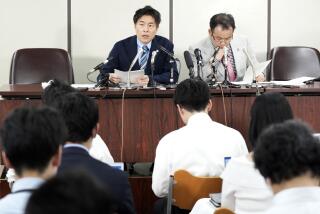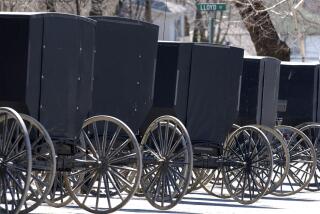Court Orders Cult’s Religious Status Revoked
TOKYO — A court ordered Monday that Aum Supreme Truth, the cult accused of attacking the Tokyo subways with poison gas last spring, be stripped of its status as a religious organization.
While not directly addressing the cult’s role in the subway terror, the court found the Supreme Truth organization guilty of producing sarin, the deadly nerve gas that killed 11 and sickened more than 5,500 in the March 20 attack.
“Constructing a plant to produce sarin and trying to make the gas in a large amount constitutes plotting of murder,” Presiding Judge Seishi Kanetsuki of the Tokyo District Court said in issuing the dissolution order.
Never before in postwar Japan has a court ordered the revocation of a religious organization’s status on grounds of criminal activity.
The district court decision is the first step toward confiscation of the cult’s assets. That would deal a severe blow to the group’s ability to continue functioning as a disciplined organization, although followers would still have the constitutionally protected right to engage in religious practices.
By ruling that the sarin production constituted “plotting of murder” and was carried out under the instructions or approval of cult leader Shoko Asahara, the decision also cast an unusual shadow over the criminal prosecutions of Asahara and other members of his sect. Civil action in Japan normally lags far behind criminal decisions.
Asahara’s murder trial was due to begin last Thursday but was postponed when he fired his lawyer. After the court moved to appoint legal counsel for him, Asahara rehired the same lawyer.
*
Monday’s ruling, although still subject to appeal by Supreme Truth, “came much sooner than we expected,” said Yoshio Ito, an attorney representing people who feel they or their relatives have been victimized by the cult.
“It is significant because Aum will lose its status as a legal corporate entity,” Ito said. “All their assets will be taken away . . . and the followers will lose their bases for activities.”
Concern remains high among authorities and the Japanese public that cult fugitives who have escaped arrest, or other members of the group not sought by police, might launch some kind of retaliatory attack as Asahara and other top officials face trial.
Although most Supreme Truth leaders are imprisoned, followers continue to occupy the cult’s downtown Tokyo headquarters and its rural complex in Kamikuishiki, 65 miles southwest of Tokyo near Mt. Fuji.
Scattered across Japan are at least 30 properties registered to the cult, to companies affiliated with the group or to individual Supreme Truth members or officials including Asahara, according to a report Monday by Asahi Shimbun, a leading newspaper. Lawyers opposed to the cult have estimated the value of the properties at $20 million, the newspaper said.
Supreme Truth argued that its plant in Kamikuishiki was producing agricultural chemicals, not sarin. It is expected to appeal Monday’s decision to the Tokyo High Court. If that court upholds the district court’s ruling, liquidation of assets could then begin, even if the cult subsequently appeals to Japan’s Supreme Court.
More to Read
Sign up for Essential California
The most important California stories and recommendations in your inbox every morning.
You may occasionally receive promotional content from the Los Angeles Times.










